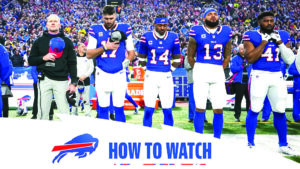By David Mullens
On Park Avenue in New York City, where the National Football League headquarters are located, executives will tell you that business has never been better. NFL Commissioner Roger Goodell makes a reported $64 million a year, appeasing 31 multimillionaire and billionaire team bosses and one nonprofit corporation (Green Bay Packers) by bringing in lots of money.

Photo courtesy of BuffaloBills.com
How much money is unclear. After decades of running as a nonprofit organization in the eyes of the Internal Revenue Service, the NFL gave up its tax-exempt status in 2015. The numbers were getting too big to maintain transparency. In 2022, the NFL made a reported $18.6 billion. In 2023, it will probably increase by a billion. Goodell has publicly stated his target revenue is $25 billion by 2027.
The league is a trade association made up of and financed by its 32 team members. The teams are separate entities and valued individually. The Dallas Cowboys are the NFL’s most valuable franchise, estimated to be worth $9.2 billion. The average NFL franchise is worth slightly more than $5 billion.
No professional sport has a foothold on America’s interest and their pocketbooks like the NFL. Baseball has nostalgia, but nothing near the TV revenue numbers. For a while, NASCAR tried to talk a big game to potential advertisers, but their audience was too regional and too limited. To expand their fan base and revenues, the NBA went global, banking on places like China. It may prove that it isn’t prudent to partner with Xi Jinping.
Soccer is the world’s most popular sport, but in America, some still equate it with the metric system. Hockey doesn’t translate to television viewing, and all other sports are target specific and not embraced by the masses. The NFL can sit fat, happy and appear shatterproof.
But recent decisions made at NFL headquarters — all in the interest of increasing profits and reaching Goodall’s short-term goals — could make the league vulnerable. If one looks closely, some cracks are just starting to surface.
Individual teams earn local revenue based on ticket sales, concessions and corporate sponsors. The NFL is responsible for shared national revenue. Merchandising, licensing contracts and TV deals negotiated by the league at the national level is where the NFL gets its billions. A series of decisions is making the league more exposed.
NFL games were once very easy to view on television. Games were available on broadcast TV. But when Fox entered a bidding war with CBS, NBC and ABC, and cable companies like ESPN were willing to pay for high profile content, the broadcast rights fees for NFL games hit astronomical levels.
Add fantasy football leagues and the NFL association with gambling entities — once taboo — and broadcasts became less about entertainment and more about gathering statistical information 24/7.
Currently, the NFL has a flippant attitude toward fans about game broadcasts. Games are scheduled for virtually any day of the week and on a vast cadre of networks. The league can move games from day to day with less than a week’s notice, at the expense of ticket buying fans. Some regular season games are available only on streaming services like Amazon Prime.
Peacock, the seventh largest streaming service in the U.S., has exclusive rights to show an NFL playoff game in January. Fan reaction to a Peacock-only broadcast of the Buffalo Bills versus Los Angeles Chargers game on December 23 was overwhelmingly negative. One X poster wrote: “So for the first time in more than a decade, I don’t have access to a live NFL game. That’s how disinterest starts @NFL.”
A lot of fans watch games at sports bars that do not subscribe to Amazon Prime or Peacock. It the NFL continues to make it difficult to watch games, fans will stop watching.
The NFL continues the myth that their officials have improved as players have improved. They have not. Players are young, in peak condition and work on their games year-round. Officials are old, out of shape and part-time employees. The two-point conversion call that went against the Detroit Lions in the Detroit vs. Cowboys game on December 30 was an official’s mistake. But the NFL continues to cover up the bad call. Coaches and players are fined if they speak out about officiating. Officials can’t talk to reporters after a game and can only make comments to a pool reporter.
In the well documented Detroit vs. Dallas debacle, the official appears to misread the players intentions of becoming eligible for a pass. The official skirted the truth with the pool reporter.
Days later, the NFL sent all 32 teams a video on how players should report eligibility to referees. How smug. The official blew a call, and the league won’t admit it. They are blaming the players.
The NFL talks a good game about supporting U.S. military organizations. They should practice what they preach. I have long maintained that the NFL should hire retiring military and put them in a yearlong NFL officiating programs. Soldiers are fit, trained to make snap decisions and would make excellent officials.
As the NFL continues to dig deeper into the gambling game, they had better get officiating right. A series of questionable calls that affect the outcome of games will challenge the integrity of the game. A scandal involving a player or an official could be devastating to the league.
It is said that: “The ignorant mind, with its infinite afflictions, passions and evils, is rooted in the three poisons: Greed, anger and delusion.” The NFL needs to stop being so greedy about broadcasting revenue and gambling affiliations and delusional about officiating.
Losing their rabid fan base, either by making the game inaccessible to average fans or jeopardizing the integrity of the game could bring the mighty league down. Consider this a warning, NFL. As one fan wrote, “That’s how disinterest starts.”
